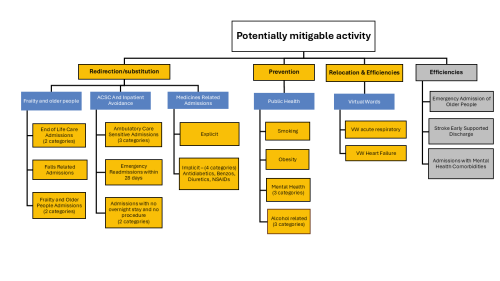Having been widely trailed, the ‘Neighbourhood Health Service’ featured heavily in the 10 Year Health Plan for England as an organising principle for reform. The next question is how to move from principle to practice. Across the country, people are working to understand how to make ‘neighbourhood health’ a reality in their area.
To support this, NHS England and the Department of Health and Social Care have launched the National Neighbourhood Health Implementation Programme (NNHIP). Through a ‘test, learn and grow’ approach, the programme aims to cultivate effective neighbourhood working.
The Strategy Unit is delighted to be part of NNHIP. Working as part of a team led by large-scale change experts NHS Horizons, we will be providing evidence, analysis and insight. And we will be supporting local areas to translate this into action.
Our role is to provide an ‘Intelligence Centre’. Flourishing neighbourhoods need knowledge from evidence and experience. They need to know what might work, and – just as crucially – what to avoid. Our vision is for neighbourhoods to have reliable, practical insights to work from.
To help set the scene, we’ve produced an evidence briefing on neighbourhood health. This summarises how neighbourhood health is currently being defined and discussed across policy, practice, and research. It brings together recent guidance, expert commentary, and implementation insights from the past year—particularly in the context of the 10-Year Health Plan. Rather than offering definitive answers, it highlights emerging themes and considerations to support local thinking and planning.
On one level, we can see clear ways to add value. The Strategy Unit has long experience of applying analytical disciplines to complex programmes – and we have plenty of experience on the ‘shift from hospital to community’ to draw upon. By adding rigour, and by looking outside the NHS, we will be able to guide the development of neighbourhood working.
But, on another level, providing insights will be extraordinarily tricky. Even a casual observer will have noticed that the term ‘neighbourhoods’ is in danger of becoming a catch-all term. This is partly the bandwagon effect. But it is also because ‘neighbourhood health’ can – utterly legitimately – be understood in different ways and from different angles.
This is not the place for an exhaustive review. But a quick glance at the territory reveals that: some people take a very holistic, community-development approach; others see a way to stabilise and augment particular NHS services; others think neighbourhoods is an excellent means of targeting specific population groups; still others have spotted an opportunity for a ‘wider determinants’ focus. (And so on).
Each of these views contains merits and drawbacks. Each starts with a particular rationale and seeks particular benefits. And, perhaps most challengingly for us, each draws upon different research traditions and philosophies: what is valued and accepted by people wanting see reductions in unplanned admissions (for example) is different from people working a more community development based approach.
This won’t be comfortable or easy territory. Which is exactly why it should be stimulating and invigorating to navigate. We’re excited at the prospect of working with the many local teams that will take part in the programme – and with those outside the programme but still craving reliable insights.
We will both create and curate insights. We will produce specific tools and products; and we will draw in high-quality evidence from many sources. And – working with Horizons and others – we will take a very active approach to helping people move from insight to action.
The start of a programme is always full of anticipation and expectation. We will share much more – through many different channels - as our work shapes up and develops. Over time, we will develop a body of useful and reliable insight – a contribution that we hope will help neighbourhood health fulfil its potential.
For now, we’re just delighted to announce that we’re part of such an important programme! If you’d like to learn more about the Intelligence Centre or discuss our work within the National Neighbourhood Health Implementation Programme, please email us at strategy.unit@nhs.net with “Intelligence Centre” in the subject line.


